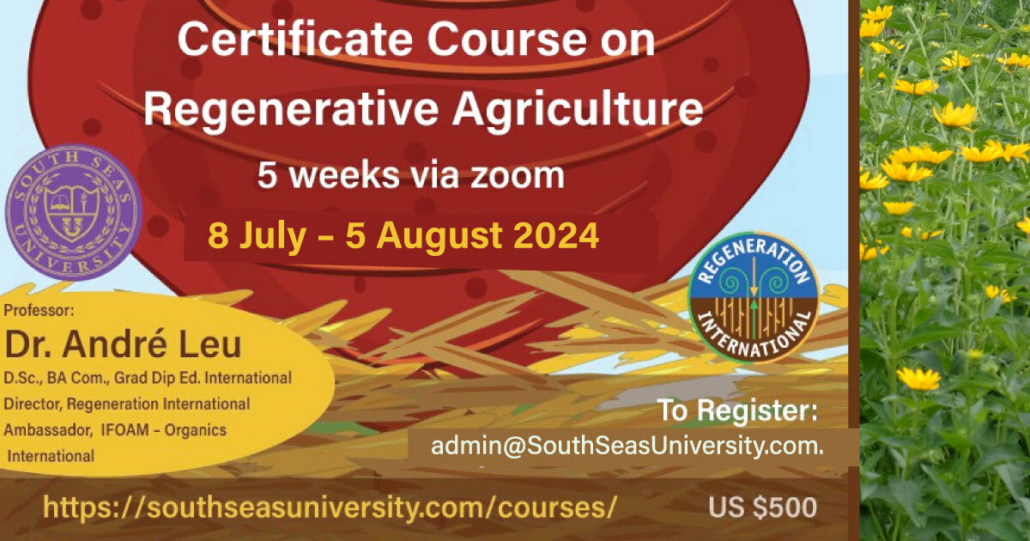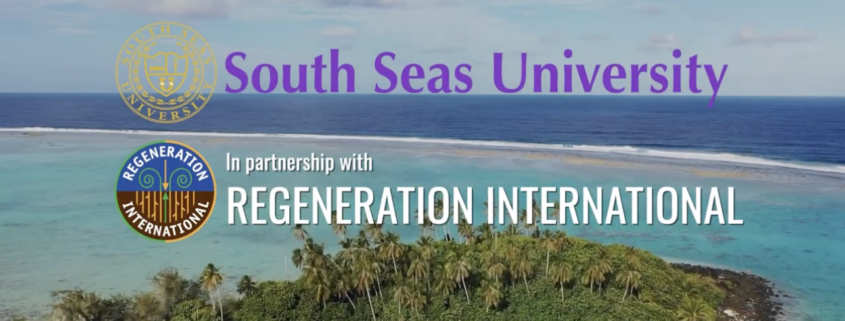Regeneration International’s Partnership With the South Seas University
The Regeneration International Academy, in partnership with the South Seas University, has held two online courses on regenerative agriculture.
This semester, we are expanding the course to include agroecology and organic agriculture with the title of AROA (Agroecology, Regenerative, and Organic Agriculture). Bringing these three major global movements together as complementary systems is essential. Very importantly, this is a certificate course from an accredited degree-granting university. We plan to have the organic regenerative agriculture faculty offer a range of courses by recognized experts in regenerative, organic, and agroecological practices and systems in the following semesters.
Most people know me as a long-term organic farmer and the international director of Regeneration International. I have decades of teaching experience, communication and adult education degrees, and a Doctorate in Environmental and Agricultural Systems. I have taught and lectured in tertiary institutions on most continents and developed and run many types of courses. These include training courses for farmers, some delivered in institutions and others on farms at farmers’ shed meetings.
I have had the opportunity to use the title of adjunct (part-time) professor for decades; however, I have only chosen to use it now. The current course I have developed in partnership with South Seas University is the most important of all the courses I have developed and taught.
From experience, I have learned that developing innovative courses in most long-established tertiary institutions is very hard. They like conformity to traditional norms and do not like taking risks. The academic mainstream largely ignores and denigrates our agricultural systems. As an organic farmer, teaching in standard agronomy courses offered by most institutions meant being ostracized and marginalized by the academic staff and management for criticizing the mainstream paradigms of toxic pesticides and synthetic fertilizers.
South Seas University (SSU) has a history of innovation, so when I was offered the opportunity to form a department of organic and regenerative agriculture, I jumped at it.
SSU was founded with a vision to provide quality education at an affordable cost, leveraging innovative technology and cooperation with the world’s leading academic institutions. It came about after political upheaval in the Dominican Republic in 1997-1998 caused numerous universities and medical schools to close. Aspiring medical professionals found themselves at the mercy of unscrupulous individuals exploiting their desperation.
Under the leadership of Sir Tom Davis, Dr. Reza Chowdhury, and Lady Carla Davis, the Board worked tirelessly to raise the necessary funds to fill the gap for these students left by the loss of their medical schools and to provide affordable degrees. By 1999, SSU gained registration with the Government of the Cook Islands as a degree-granting university. The James Cook School of Medicine (JCSM) was registered as the SSU Faculty of Medicine. It was listed in the WHO World Directory of Medical Schools and other licensing authorities. The first cohort of displaced students from the Dominican Republic formed the inaugural class at JCSM. This accomplishment provided SSU’s JCSM graduates with U.S. board exam registration eligibility. It also affirmed the quality and credibility of their education.
SSU’s management brought in distinguished faculty from the Dominican Republic, Mexico, India, Australia, and the United States. SSU forged partnerships with clinical sites across the US, UK, Dominican Republic, India, and Mexico. SSU also introduced IT programs to meet local demand and collaborated with a School in India to produce a nursing program. In the region, SSU was seen as an innovative role model in assisting students in obtaining Medicine, Nursing, and IT degrees. This international collaboration fostered a diverse student body, enriching the educational experience and broadening perspectives.
Running and financing a small university in a developing country brought numerous challenges, especially the costs of securing the necessary registrations and recognitions from relevant authorities before students enrolled. The expensive and limited housing in the Cook Islands, the high cost of communications, and political changes meant numerous adjustments and reorganizations of teaching methods had to be implemented as SSU built its foundation.
The advances in online technology saw SSU increase its reach and affordability for students, reducing the need for travel and accommodation costs.
However, the passing of SSU’s Chancellor, Sir Tom Davis, brought new challenges. Then, almost two years of border closures and lockdowns due to COVID-19 presented additional challenges that SSU and its Board had to navigate.
With the borders opening and life returning to pre-COVID normal, the Chief Operating Officer and board chair, Dr. Reza Chowdhury, encouraged Lady Carla Davis to take on her late husband’s role as Chief Executive Officer and Dr. Johannes Schonborn, Dean of the James Cook School of Medicine, as acting Chancellor. Lady Carla Davis had the vision to expand the agriculture and health/nutrition programs and provide/pioneer other unique online courses to revolutionize education and help young people create a better world.
SSU has started to grow again and has restarted offering online certificate courses. Lady Carla Davis (a nutrition educator), plans to offer OL programs in Nutrition and medical degree courses again.
Dr. Bernell Christensen, PhD, from Utah, will set up the School of Psychology program for Bangladesh (to start) through the James Cook School of Medicine. He has cooperation agreements with leading medical schools to stream their lectures online to SSU students. These students will access clinical clerkships at accredited teaching hospitals in the US and UK.
As part of the holistic approach, a certificate course in Regenerative Health taught by educator, physician, and pediatrician Dr. Michelle Perro, MD, is being offered this semester. Dr Perro is the co-author of the highly acclaimed book What’s Making our Children Sick? This course is open to all and complements the innovative medical degree program. It features:
- The state of our health and how we got here.
- An algorithm on how to move from dependency on pharmaceuticals towards food-based solutions to address health concerns and challenges
- Making our children well: A look at the microbiome
- Nutrition for Health Basics with practical solutions
- Homeopathy as a safe, effective, and affordable tool for managing acute and chronic health situations
Consistent with Lady Carla Davis’s vision to provide unique online courses to revolutionize education and help young people create a better world, SSU is offering a certificate course in Education for Total Consciousness (ETC). Taught by His Holiness Jagadguru Swami Isa, the course gives practicing or aspiring teachers and parents the fundamentals of teaching ‘total knowledge’ in the classroom or at home.
Negotiations and plans are underway for more certificate courses, as these are the most accessible. Later, as funding increases, more degree and postgraduate degree courses will be added.
From my perspective as a long-term organic farmer and educator, providing high-quality, accessible, and affordable education is the key to scaling up our nature-based regenerative systems. This is essential to break degenerative industrial agriculture’s near monopoly control on education. SSU gives us a critically important opportunity to do this.


